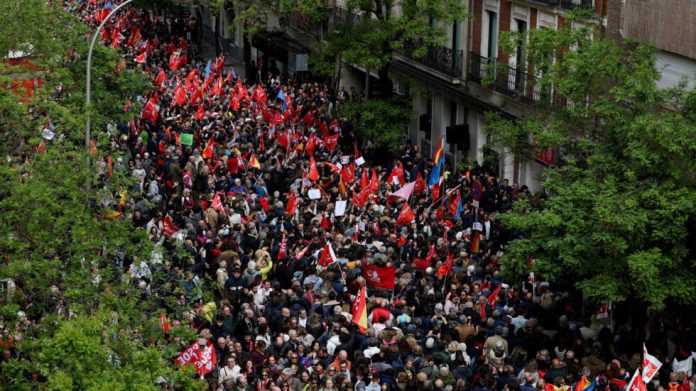Thousands of Socialist Party supporters travelled from across Spain to a rally in Madrid on Saturday to urge Prime Minister Pedro Sánchez to stay in office after his resignation announcement.
Pedro Sánchez said on Wednesday he would take a few days to reflect to decide whether he wanted to continue leading the government after a court began investigating corruption in his wife’s private affairs.
“Now that we’ve reached this point, the question I quite legitimately ask myself is: is it all worth it? I sincerely don’t know,” the prime minister wrote in his letter. “I need to stop and think about it.”
A Madrid court said it had opened a preliminary investigation into Sánchez’s wife, Begoña Gómez. The investigation followed a complaint by the initiative group Manos Limpias (Clean Hands), a self-proclaimed trade union with links to the far-right, which has a long and familiar history of using the courts to persecute those it sees as a threat to Spain’s democratic interests.
Spanish Prime Minister said it was part of a long campaign of defamation against him and his family by political opponents. Despite, he rejects the allegations made against his wife and said he would announce his decision on his future on Monday.
“We often forget that there are people behind politicians,” he wrote. “I’m not all embarrassed to say that I’m a man who’s deeply in love with his wife and who has to live with the helplessness of seeing all the mud that’s slung at her every single day.”
Sánchez insisted his wife’s innocence and openly accused the conservative People’s Party (PP) and far-right Vox party of colluding with Manos Limpias and a hostile media in an attempt to cause his “personal and political downfall” by attacking his wife.
However, support for the current Prime Minister has been extremely high. Outside the headquarters in Madrid, thousands of people gathered to show their support for Sanchez, calling for Sánchez to stay, many waving flags or with their faces painted. Some 12,500 supporters joined the rally, according to the Spanish government.
Opposition parties have condemned Sanchez’s move. For example, a poll conducted for the People’s Party (PP) by polling company Sigmados showed that 54.1 per cent of those surveyed believed that Sanchez’s period of reflection was a “political strategy” to gain support ahead of the Catalan elections on 12 May and the European Parliament elections in June.
Some 56.4 per cent of the 1,527 people polled said they believed Sánchez would not resign on Monday, while 21.2 per cent said they thought the Prime Minister would call for a vote of confidence in parliament.
Despite a well-earned reputation as a gambler and a very shrewd politician, Sanchez says he is not a power-crazed leader, as his enemies are trying to make people believe:
“For all the caricatures the right and the far right have tried to force on me, I’ve never been attached to power,” he wrote towards the end of Wednesday’s letter. “What I am attached to is duty, political commitment and public service.”
Pedro Sánchez was suspended by his own party in 2016 for refusing to assist another corruption-ridden Popular Party government, but he regained the leadership seven months later and the following year became the first Spanish party leader to successfully topple a government with a vote of no confidence.
